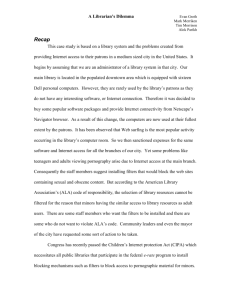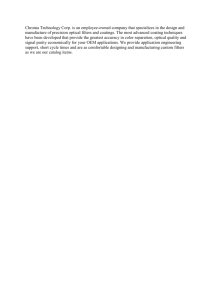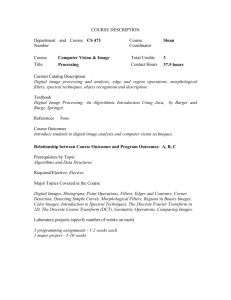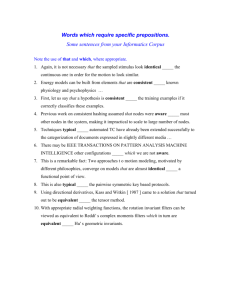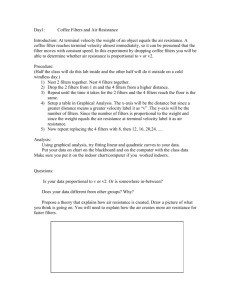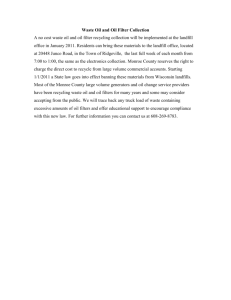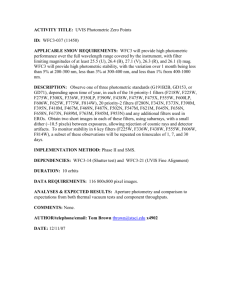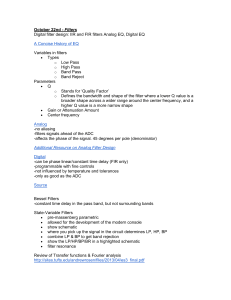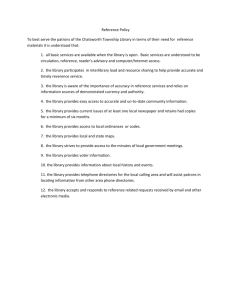GroupSocialRemovedQu..
advertisement
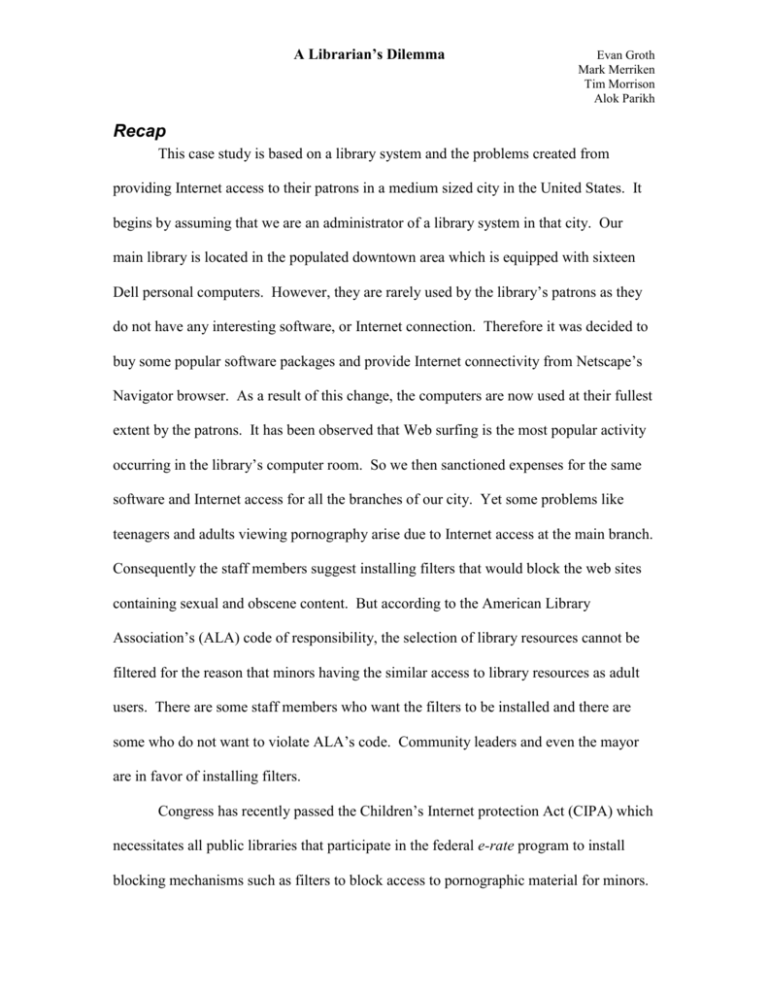
A Librarian’s Dilemma Evan Groth Mark Merriken Tim Morrison Alok Parikh Recap This case study is based on a library system and the problems created from providing Internet access to their patrons in a medium sized city in the United States. It begins by assuming that we are an administrator of a library system in that city. Our main library is located in the populated downtown area which is equipped with sixteen Dell personal computers. However, they are rarely used by the library’s patrons as they do not have any interesting software, or Internet connection. Therefore it was decided to buy some popular software packages and provide Internet connectivity from Netscape’s Navigator browser. As a result of this change, the computers are now used at their fullest extent by the patrons. It has been observed that Web surfing is the most popular activity occurring in the library’s computer room. So we then sanctioned expenses for the same software and Internet access for all the branches of our city. Yet some problems like teenagers and adults viewing pornography arise due to Internet access at the main branch. Consequently the staff members suggest installing filters that would block the web sites containing sexual and obscene content. But according to the American Library Association’s (ALA) code of responsibility, the selection of library resources cannot be filtered for the reason that minors having the similar access to library resources as adult users. There are some staff members who want the filters to be installed and there are some who do not want to violate ALA’s code. Community leaders and even the mayor are in favor of installing filters. Congress has recently passed the Children’s Internet protection Act (CIPA) which necessitates all public libraries that participate in the federal e-rate program to install blocking mechanisms such as filters to block access to pornographic material for minors. A Librarian’s Dilemma Evan Groth Mark Merriken Tim Morrison Alok Parikh The e-rate program is a discounted rate for Internet access which is charged to libraries by telecommunication carriers. Last year $25,000 was discounted by the library system in e-rate through this program. Thus if the library administrators do not buy the blocking mechanisms, the budget will have to be deducted by this amount to make up for the lost e-rate subsidy. Stakeholders There are three main stakeholders in this case. The primary stakeholder is the head librarian, the secondary is patrons and the tertiary is library staff. The head librarian, who is the primary stakeholder, they may lose the discounted rate Internet access that they currently receive through the e-rate program. Being a medium sized institution, it would be unfortunate for the system’s bottom line. Library patrons are the secondary stakeholders as they will lose their freedom to access pornographic material if the filters are installed in computers. The library staff is the tertiary stakeholder because there is some staff that is in favor of installing filters while there is some staff which is against installing filters. The staff that is in favor of filters wants to block underage children from having access to pornographic material on the web. On the other hand, the staff that is against installing filters does not want to infringe the ALA’s code of responsibility. We are analyzing the case from the perspective of all three stakeholders as they all correlate with each other. Analyzing the case from the perspective of head librarian would be senseless as patrons and library staff are equally important in dealing with the issue. A Librarian’s Dilemma Evan Groth Mark Merriken Tim Morrison Alok Parikh Social Problems In communities all across America the public library is thought of as a place to learn. The concept of a library is fundamentally to provide knowledge and the opportunity to learn to those who seek it. It is a place where young minds and old alike can be enriched. In our society there are a few social norms we expect to see upheld in any library we may visit. A few of the most common are a general silence about the area, quality service, and as little disturbance as possible. Also in our society pornographic and other sadistic types of materials are considered to be generally vulgar and depraved, not enriching. Therefore it is easy to see why parents and other prominent members of the community would be upset with the new computer systems allowing the youth access to these things. With so many people outraged something must be done about this issue. Ethical Problems To get a feel for the kinds of ethical issues we can find in this case, let’s compare the pros and cons of implementing or rejecting the filtering software. If the library complies with the Government and installs the filters it will benefit in many ways. Obviously the viewing of obscene materials will be, for the most part, prevented. This will make the parents, lawmakers and city officials happy. Also the library will continue to be granted a sizeable discount from the government. With all this potential benefit to be had by installing the filters, the decision may seem like a simple one. However, there are opposing factors. The library claims to follow the ALA code which states that all patrons should be allowed equal access to the library’s resources. This may seem kind of A Librarian’s Dilemma Evan Groth Mark Merriken Tim Morrison Alok Parikh trivial at first but many people feel that the freedom of information is an extremely important principal. We need to determine the ethicality of the library just blowing off the ALA code along with the strong opinions of some of its patrons in favor of the benefits. Also a solution to whether or not it is ethical to restrict the view of certain kinds of content. Another concern is that children could possibly be exposed to explicit materials when browsing the Internet. Some would suggest that a tiered access system be implemented. This means that different users would have different privileges on the computer systems. For example: blocking explicit content for users under a certain age. Sounds great but, further analysis reveals more ethical issues. One could argue that restricting viewable web content based on a patron’s age is discrimination. This makes things even more difficult because even though the library would be protecting younger patrons it would still be discriminating against other individuals. If we consider for a moment the laws governing pornography we can see that something must be done. Pornography is illegal to view if the person viewing is under the age of 18. Also viewing certain types of pornography such as explicit images of minors is considered a felony. This is law. It is the not directly the libraries fault that minors are viewing pornography, this is a decision made by an individual. However, one could argue that there may be some kind of duty or obligation that the library has. Perhaps the library should try to prevent minors from accessing these materials since they provide the means to do so. This way the library is helping to prevent crime from taking place and to protect the innocence of younger children. Our problem here simply is what to do about the A Librarian’s Dilemma Evan Groth Mark Merriken Tim Morrison Alok Parikh library offering the chance for minors to freely view pornography. We must determine if this is the library’s responsibility. Upholding human dignity in the workplace is common practice for most professional organizations and public Libraries are no exception. The practice of upholding human dignity involves respecting the opinions and values of those around you and considering the effects of ones actions on other individuals. Considering this we can see that any person viewing explicit materials on the library computer system has the potential to violate this principal by disturbing other patrons. The question we must answer is if this is happening should the library not take this into consideration. Determining what is right in this situation will be difficult. As a patron in the library utilizing the computer system one would want the ability to access any information desired. As citizens under a government we must abide by certain laws such as those against pornography. So if filters block pornography but could also block other information how do we solve this problem? We will need to examine these circumstances with the idea of ethicality in mind. Technical Problems There are multiple technical issues that arise when attempting to censor information in a public library. The main issue in our case would be the e-rate discount that governmental agencies provide the library totaling approximately $25,000 a year that requires filtering software to be installed. If filters are not installed on the library computers the government will cease to provide the discount and the head of the library will be held responsible. Additionally the local community and library staff has applied A Librarian’s Dilemma Evan Groth Mark Merriken Tim Morrison Alok Parikh pressure on the library administrators to take corrective action. Filters however, are a whole field of technical problems themselves. No one has ever coded a perfect filter. There are third party filters and government written filters for us to choose from when satisfying the requirement of filtering content. What makes one filter better than another? How do we know whatever filter we install will filter solely inappropriate content? Will the filter search for words in a page or will it instead simply block a hard coded list of websites? With the implementation of filters issues of maintenance arise. Knowing that new content is constantly being added to the web requires our filter to be constantly updating. If our filter must be constantly updated then who could be deemed responsible enough to make the decisions of what is acceptable and what is not. How can we trust one network administrator to basically function as the gate keeper of information? And why should one person be allotted such great power to simply satisfy a government requirement? Another technical issue dealing with the implementation of filters is simply that the kids who are being censored are on average computer savvy themselves. They will find ways around the filter, ways to break it; they might even be provoked to act maliciously after seeing that their content is being blocked. As head of the library we must also take into account the ALA code of responsibility. We have both loyalties to this code and the government, providing us with a both technical and moral issue. If we choose to not censor content obeying the ALA code the library will end up in a state of disaster without its funding. However, if we install the filters, we break the ALA code, giving the government that much more control over our freedom(s). Even if we do implement filters they could potentially block content A Librarian’s Dilemma Evan Groth Mark Merriken Tim Morrison Alok Parikh that is actually appropriate angering library patrons as they are stopped from doing something perfectly acceptable. From choosing which filter to use to implementing and maintaining it, many difficult problems arise which could potentially outweigh the initial problem itself of under age patrons viewing adult content. Solutions to Technical Problems As a way for the library system to keep the e-rate discount, they can comply with the recent federal legislation and install filtering software. As a way to ensure an adequate filtering solution is selected, the library system can submit requests for proposals (RFPS) to multiple vendors. This way the library system can then select what it deems to be the optimum filtering solution based upon the presentations and documentation submitted to them by the various, interested vendors. Most vendor contracts usually include for the installation, administration, and maintenance of a new system for a finite amount of time. Thus allowing the filters to be properly configured and groomed for production use within the system and for a smooth transition. In addition to installing filtering software for the library system’s PCs, a network administrator can be employed to help maintain the software. This network administrator will be tasked with: keeping the filter operational, making sure that the filtering is effective, fixing any false positives which may arise during operational use, and closing any loopholes which might be created. Solutions to Ethical Problems
